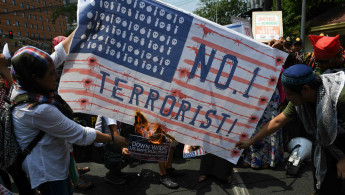Iran labels US presence in Middle East as 'terrorist'
Iran's lawmakers on Tuesday overwhelmingly approved a bill labelling US forces in the Middle East as "terrorist", a day after the US designated Iran's Revolutionary Guard as the same, state TV reported.
Defence Minister Gen. Amir Hatami introduced the bill authorising the government to act firmly in response to "terrorist actions" by US forces.
It demands authorities use "legal, political and diplomatic" measures to neutralise the American move, without elaborating.
The US move aims at "thwarting Iran's influence", and shows that America's longstanding sanctions against Iran have become ineffective, Hatami told lawmakers.
During the debate, some hard-liner lawmakers had demanded listing the entire US army and security forces as terrorist.
The TV report said 204 lawmakers approved the bill, out of 207 present at the session in the 290-seat chamber. Two lawmakers voted against the bill and one abstained.
However, it remains unclear how the bill's passage in parliament would affect the Guard's activities in the Persian Gulf, where the US Navy has in the past accused Iranian patrol boats of harassing American warships.
The Iranian decision could have real effects on the ground. In the case that a US soldier was found on Iranian territory, his treatment would not necessarily be bound to the normal code of law.
Iran's Revolutionary Guard has forces and wields influence in Iraq, Syria, Lebanon and Yemen, and is in charge of Iranian missiles that have US bases in their range.
The Guard's designation by the US - the first-ever for an entire division of another government - adds another layer of sanctions to the powerful paramilitary force and makes it a crime under US jurisdiction to provide it with material support.
Depending on how broadly "material support" is interpreted, the designation may complicate US diplomatic and military cooperation with certain third-country officials, notably in Iraq and Lebanon, who deal with the Guard.
Iranian President Hassan responded in full force after the Guard was blacklisted, saying "You want to use terrorist groups as tools against the nations of the region... you are the leader of world terrorism".
President Donald Trump and Secretary of State Mike Pompeo announced the designation last week.
The move comes on top of Trump's decision to pull the US out of an international deal with Iran that was meant to lift crippling economic sanctions in return for the government allowing its nuclear technology to be restricted and kept under close supervision.
Iran has struggled to cope with flash flooding in recent weeks. Foreign Minister Javad Zarif said US sanctions are impeding aid efforts and "economic terrorism".
Follow us on Twitter: @The_NewArab




 Follow the Middle East's top stories in English at The New Arab on Google News
Follow the Middle East's top stories in English at The New Arab on Google News
![The UAE is widely suspected of arming the RSF militia [Getty]](/sites/default/files/styles/image_330x185/public/2024-11/GettyImages-472529908.jpg?h=69f2b9d0&itok=Yauw3YTG)
![Netanyahu furiously denounced the ICC [Getty]](/sites/default/files/styles/image_330x185/public/2024-11/GettyImages-2169352575.jpg?h=199d8c1f&itok=-vRiruf5)
![Both Hamas and the Palestinian Authority welcomed the ICC arrest warrants [Getty]](/sites/default/files/styles/image_330x185/public/2024-11/GettyImages-2178351173.jpg?h=199d8c1f&itok=TV858iVg)